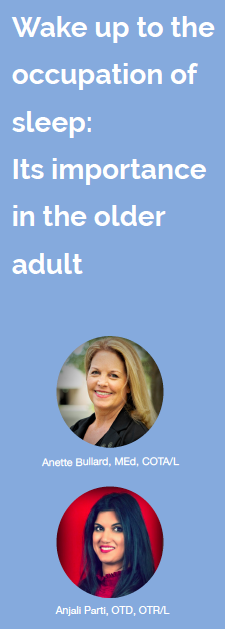Wake up to the occupation of sleep: Its importance in the older adult
by: Anette Bullard, MEd, COTA/L and Anjali Parti, OTD, OTR/L
 Everyone has experienced having to power through the day after a night of not sleeping well with every aspect of the day feeling more challenging due to your lack of sleep. The National Institute of Health (2017) identifies sleep as one of the most important occupations for maintaining all aspects of health. In fact, the Centers for Disease Control and Prevention (2018) has recognized sleep deprivation as a public health problem with broad, negative effects on safe occupational performance. For the older adults the challenges brought on by age compounded with a lack of sleep can further decrease successful occupational performance. Many age-related changes tend to disturb patterns of sleep and the myth that older adults need less sleep is actually incorrect (Suni, 2022b). The older adult is confronted with additional sleep obstacles such as, chronic conditions, medications, diminished physical activity, and decreased cognitive exercise, all of which have all been associated with decreases in sleep satisfaction. The resulting downward spiral of poor sleep results in less successful occupational engagement. The Occupational Therapy Practice Framework includes ‘rest and sleep’ as an area of occupation and defining occupational therapy practitioners as qualified professionals to assist clients with the occupation of rest and sleep (American Occupational Therapy Association, 2020). This brief article seeks to assist practitioners with identifying resources and awareness for more consistently addressing the occupation of sleep in the older adults.
Everyone has experienced having to power through the day after a night of not sleeping well with every aspect of the day feeling more challenging due to your lack of sleep. The National Institute of Health (2017) identifies sleep as one of the most important occupations for maintaining all aspects of health. In fact, the Centers for Disease Control and Prevention (2018) has recognized sleep deprivation as a public health problem with broad, negative effects on safe occupational performance. For the older adults the challenges brought on by age compounded with a lack of sleep can further decrease successful occupational performance. Many age-related changes tend to disturb patterns of sleep and the myth that older adults need less sleep is actually incorrect (Suni, 2022b). The older adult is confronted with additional sleep obstacles such as, chronic conditions, medications, diminished physical activity, and decreased cognitive exercise, all of which have all been associated with decreases in sleep satisfaction. The resulting downward spiral of poor sleep results in less successful occupational engagement. The Occupational Therapy Practice Framework includes ‘rest and sleep’ as an area of occupation and defining occupational therapy practitioners as qualified professionals to assist clients with the occupation of rest and sleep (American Occupational Therapy Association, 2020). This brief article seeks to assist practitioners with identifying resources and awareness for more consistently addressing the occupation of sleep in the older adults.
